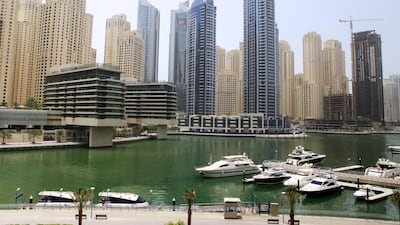Property may be a cornerstone of the UAE economy but the online search market remains relatively unsophisticated and has plenty of scope for growth, according to a new study.
A white paper titled Online Real Estate Trends in the UAE highlights the fact that online search queries per user are far higher in mature markets than across the Middle East and North Africa (Mena) region.
The paper, co-produced by Google and propertyfinder.ae, found users in the UAE made more searches per person than any other country in the region but still lagged way behind in terms of global activity – the average user in France made nine times as many searches.
Saudi Arabia is the biggest market in the region in terms of the volume of searches made, followed by the UAE, Egypt, Morocco and Qatar. However, Egypt is the fastest growing market, up 33 per cent year-on-year.
Another major trend is the rapid growth in the number of searches made on mobile devices.
Mobile search queries increased by 130 per cent in 2013, and were up a further 90 per cent in 2014. In the first quarter of this year, more than 35 per cent of real estate queries were made via mobile devices.
Propertyfinder.ae said the proportion of its own traffic that came via its mobile site grew from 19.5 per cent in the first quarter of last year to 28 per cent by the end of the year.
“At certain times of the day, mobile traffic for our site outstrips desktop,” said the firm’s marketing director Alastair Sherriffs.
He added that the region’s users were also less sophisticated in terms of how they use sites. For instance, those searching for properties still use high-volume keywords such as “apartments” and “Dubai” and then narrow searches.
“In more established markets, they are much more refined. In London, someone would search for a ‘two-bed end terrace in Clapham North’,” says Mr Sherriffs.
He added that his firm is working with brokers in a bid to improve understanding users, stressing the importance of decent photography and information.
“We’re trying to get it on a par with what a western audience expects,” he said.
There are some difficulties with this, of course. Agents are still at the mercy of landlords, and many insist on listing the same property with several brokers, which means unwitting buyers or renters can end up being taken back to the same places. On occasion, properties are also falsely advertised, with the wrong photos used or selling prices deliberately misquoted.
“Sometimes, there are properties listed at prices that seem too good to be true. They often are,” Mr Sherriffs said.
He said at Propertyfinder.ae “we do all we can” to combat this, and the company plans specific product launches later this year to combat abuses.
He admitted policing the hundreds of brokers listing properties can be difficult, though.
“We only allow brokers on the site. We don’t have landlords offering rooms for rent. It means we’re not diluted. We focus on good content for good customers and brokers.”
Ann Boothello, a property marketing manager for the local listings site dubizzle.com, said that it also places controls over agents posting ads, although its site does have listings offering room shares.
Ms Boothello said Dubizzle’s online property segment attracts more than 3.5 million visits a month.
“With such a large scale of property seekers visiting us, regulating agents is something we take very seriously. Upon posting a property ad as an agent we ask agents to submit documents to verify their authenticity,” she said.
For instance, Dubai agents need to post their Real Estate Regulatory Agency licence details. Outside the emirate, brokers need to post their company’s trade licence and their own employment visa details.
mfahy@thenational.ae
Follow The National's Business section on Twitter


